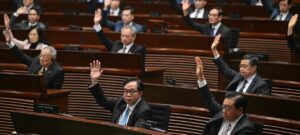 Hong Kong’s pro-Beijing leadership has enacted a new “security law,” allowing for harsher penalties and increased police authority to quash dissenting voices.
Hong Kong’s pro-Beijing leadership has enacted a new “security law,” allowing for harsher penalties and increased police authority to quash dissenting voices.
Hong Kong Approves Expansion of “Security Law”
The pro-Beijing leadership in Hong Kong now has the power to crack down even harder on critical voices as a new law introduces harsher penalties and grants more authority to the police. Human rights advocates express sharp criticism.
The outcome is clear: the legislative assembly in Hong Kong has unanimously passed a new “security law.” It is controversial as it grants further powers to the political leadership to silence dissenting voices.
Following pro-democracy protests in 2019, the first “national security law” was introduced under pressure from the Chinese government, effectively silencing the democracy movement. The new law builds upon this foundation. Just two weeks after its initial proposal, it was rapidly passed: the Chief Executive of the Chinese special administrative region, John Lee, urged lawmakers to push it through the Legislative Council as quickly as possible.
Significantly Tougher Penalties
The law imposes severe penalties for a range of actions deemed a threat to national security. Charges such as treason and rebellion against the state carry life imprisonment. Possessing publications advocating for Hong Kong independence from China could result in multiple years of imprisonment. Additionally, the police are granted increased powers to investigate or detain suspects in certain cases.
Lee announced that the law would come into effect on Saturday following the session. The government was constitutionally obligated to introduce the law but had previously failed to do so. There was no doubt about approval as the 90 legislators in the Legislative Council are mostly loyal to Beijing. Prior to the approval, there were minimal protests against the draft.
Substantial Autonomy of Hong Kong at Stake
Critics fear a further suppression of freedom of expression. Human rights organizations view the new law as a means to suppress opposition. The precursor in 2020 was already seen as a significant encroachment on the autonomy of the former British colony, which had been promised “One Country, Two Systems” for at least 50 years upon its handover to China in 1997.

